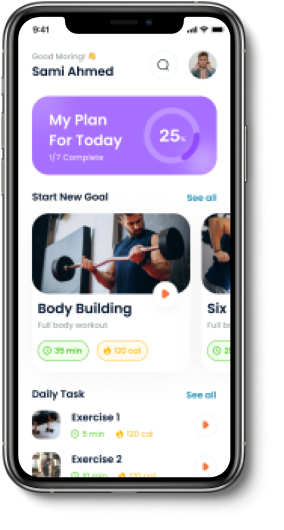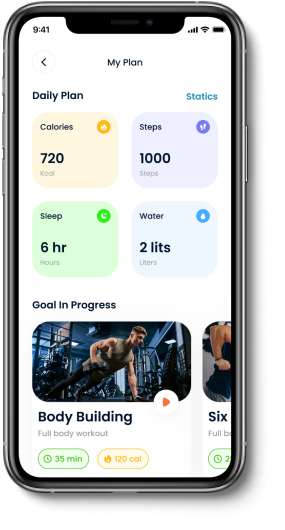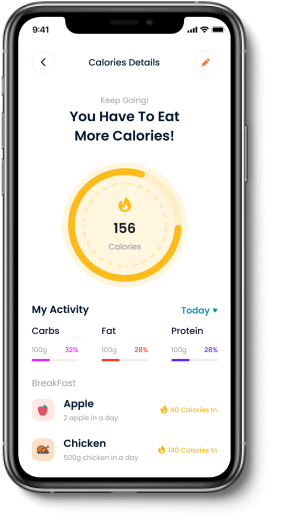What We Provide In fitness app
In today’s fast-paced world, where health and fitness are paramount, technology is playing a pivotal role in transforming the way we approach our wellness goals. Fitness apps have become indispensable tools for individuals looking to stay active, monitor their progress, and achieve their fitness aspirations. In this comprehensive guide, we will delve into the world of fitness apps, exploring their benefits, key features, popular players in the niche, and the essential functionalities required for a successful fitness app. Additionally, we will touch upon the technologies, time frame, and costs involved in developing such apps. So, let’s embark on a journey to discover how fitness apps are reshaping the way we stay healthy and active.
Benefits of fitness app and Wellness Industries
The fitness and wellness industry has witnessed a significant transformation with the advent of mobile apps. Let’s dive deeper into the advantages of these apps and how they are revolutionizing the way we approach fitness:
- Accessibility and Convenience: Fitness apps bring the gym to your fingertips. They allow users to access workout routines, nutrition plans, and progress tracking wherever and whenever they want.
- Personalization: These apps offer tailored workouts and nutrition plans based on individual goals and fitness levels, providing a more personalized fitness experience.
- Motivation and Accountability: Many fitness apps incorporate social features and gamification elements to keep users motivated and accountable, making workouts more engaging.
- Progress Tracking: Users can monitor their progress through features like fitness tracking, calorie counting, and body measurement recording, helping them stay on track and reach their goals.
- Variety of Workouts: Fitness apps offer a wide range of workout options, from yoga and HIIT to strength training and cardio, catering to diverse fitness preferences.
- Nutrition Guidance: Some apps include dietary recommendations, meal planning, and calorie tracking, ensuring users maintain a balanced approach to their fitness journey.
- Community Support: Users can connect with like-minded individuals, share achievements, and seek advice within the app’s community, fostering a sense of belonging.


Features of fitness app
When it comes to fitness apps, several key features enhance the user experience and set them apart from the competition. Let’s take a closer look at these essential features:
- Workout Libraries: A diverse collection of pre-designed workouts, including video demonstrations and step-by-step guides.
- Progress Tracking: Tools for monitoring fitness progress, including charts, graphs, and visual representations of achievements.
- Customization: The ability to personalize workouts, nutrition plans, and goals.
- Notifications and Reminders: Automated reminders for workouts, meal times, and goal deadlines.
- Social Integration: Integration with social media platforms for sharing achievements and connecting with friends.
- Wearable Device Compatibility: Synchronization with fitness trackers and wearables for real-time data tracking.
- Nutrition and Meal Planning: Features for tracking calorie intake, creating meal plans, and accessing a nutritional database.
- Community and Support: Forums, chat features, and peer support to foster a sense of community.
- Offline Access: The option to download workouts and nutrition plans for offline use.
Key Features for a Successful fitness app Development
To create a successful fitness app, developers should focus on the following key features:
- User Profiles: Users should be able to create personalized profiles with their fitness goals, current stats, and preferences.
- Workout Builder: An easy-to-use tool for users to customize their workouts based on their fitness level and goals.
- Progress Tracking Dashboard: A visually appealing dashboard that displays fitness progress over time.
- Nutrition Database: A comprehensive database of foods and their nutritional values for accurate calorie tracking.
- Social Integration: The ability to connect with friends, share achievements, and compete in challenges.
- Wearable Integration: Compatibility with popular fitness trackers and smartwatches.
- Push Notifications: Reminders for workouts, meal times, and goal milestones.
- Community Support: In-app forums, chat, and the ability to follow other users for motivation and support.
- Offline Access: The option to download workouts and nutrition plans for offline use, especially useful for users with limited data connectivity.

Technologies, Time Frame, and Cost
Developing a fitness app involves several factors that influence the choice of technologies, time frame, and costs:
- Technologies: Depending on the platform (iOS, Android, or both), technologies like Swift, Kotlin, React Native, and Flutter may be used. Backend technologies like Node.js, Ruby on Rails, or Django can be chosen.
- Development Time Frame: A basic fitness app may take around 4-6 months, while a more complex one with extensive features can take 9-12 months or longer.
- Cost Range: The cost can vary widely, with basic apps starting at $20,000 – $50,000, medium complexity apps ranging from $50,000 – $100,000, and complex apps exceeding $100,000 in development costs.
